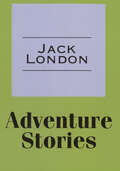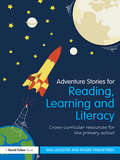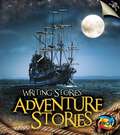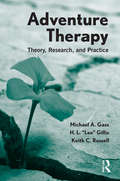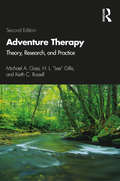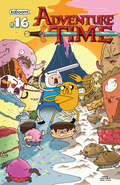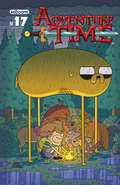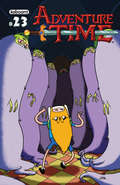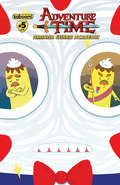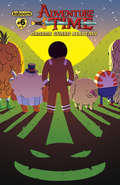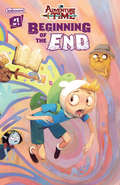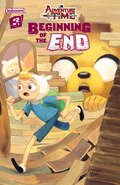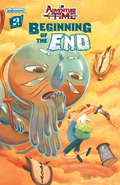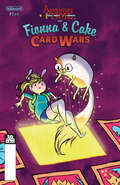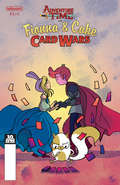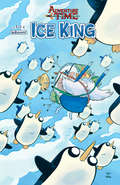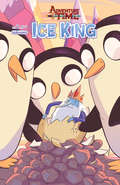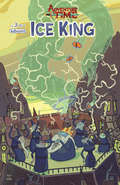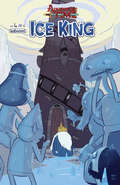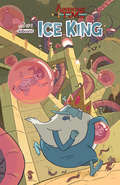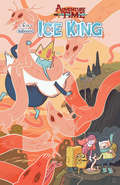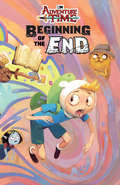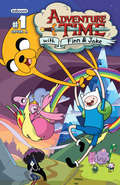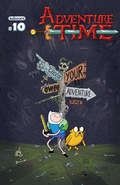- Table View
- List View
Adventure Stories
by BPI India Pvt Ltd"Adventure Stories" is collection of short stories, The book is design to reading out to kids or encouraging them to read stories and develop children's oral skills.
Adventure Stories
by Jack LondonThis text aims to capture the spirit of the American wilderness and its people, in the early 20th century. These youthful tales also include important social themes and ideas. By the age of 29, Jack London was the highest-paid and most widely read author in America, thanks to the huge popularity of The Call of the Wild, The Sea Wolf, and White Fang. Themes of these books also pervade this collection of short stories: survival though adaptation, compassion for the less fortunate, a respect for physical power in both man and nature, and the need for social justice.
Adventure Stories for Reading, Learning and Literacy: Cross-Curricular Resources for the Primary School
by Mal Leicester Roger TwelvetreesAdventure Stories for Reading, Learning and Literacy takes a unique approach to cross-curricular teaching in the primary classroom. Providing eight original adventure stories, the authors build up a suite of resources and activities for teachers to use in the classroom, providing cross curricular links in line with the PNS framework, to literacy, science, PE, design and technology, numeracy, geography and history. Though the stories will interest both girls and boys, they take special care to appeal to boys, who are known to achieve less highly than girls in reading and writing, and include themes such as: cars football ghosts and ghouls heroic deeds space and aliens. Each story is linked explicitly to moral and social values, and can be used to reinforce citizenship, PHSE and SEAL initiatives in primary schools. With photocopiable resources for each story, this book offers instant ideas which can be implemented easily in teacher’s plans and in the classroom and assembly, and will appeal to all busy teachers, NQTs and teachers in training.
Adventure Stories: Writing Stories (Writing Stories Ser.)
by Anita GaneriThis book introduces readers to the exciting world of writing adventure stories and is a perfect resource for meeting Common Core State Standards in writing. Key features of the genre are explained and readers are guided through the process of writing their own story. Top tips are given covering planning, writing dialogue, developing characters, adding narrative plot twists, using descriptive language and more! Engaging photographs, eye-catching illustrations, and a wealth of ideas bring the genre to life. An adventure story running throughout the book draws readers in, offers concrete examples of how the tips can be put into practice and will inspire readers to get writing their own adventure stories.
Adventure Therapy: Theory, Research, and Practice
by Michael A. Gass H.L. "Lee" Gillis Keith C. Russell<p>The evolution and history of adventure therapy, as chronicled in the second chapter of this book, well demonstrates how far this field has evolved from a “divergent therapy” into an efficacious form of therapy that engages clients on cognitive, affective, and behavioral levels. Adventure Therapy is written by three professionals who have been at the forefront of the field since its infancy. The theory, techniques, research, and case studies they present are the cutting edge of this field. <p>The authors focus on: <li> the theory substantiating adventure therapy <li> illustrations that exemplify best practices <li> the research validating the immediate as well as long-term effects of adventure therapy, when properly conducted.</li> <p> <p>This book is the leading academic text, professional reference, and training resource for adventure therapy practices in the field of mental health. It is appropriate for a wide range of audiences, including beginner and experienced therapists, as well as graduate students.
Adventure Therapy: Theory, Research, and Practice
by Michael A. Gass Keith C. Russell H.L. "Lee" GillisThis revised text describes the theory substantiating adventure therapy, demonstrates best practices in the field, and presents research validating the immediate and long-term effects of adventure therapy. A leading text in the field of adventure therapy, outdoor behavioral healthcare, and wilderness therapy, the book is written by three professionals who have been at the forefront of the field since its infancy. This new edition includes fully updated chapters to reflect the immense changes in the field since the first edition was written in 2010. It serves to provide information detailing what is occurring with clients as well as how it occurs. This book provides an invaluable reference for the seasoned professional and is a required source of information and examination for the beginning professional. It is a great training resource for adventure therapy practices in the field of mental health.
Adventure Time #16 (Adventure Time #16)
by Pendleton WardTHE FIRST ISSUE OF A NEW ARC AND THE PERFECT JUMPING-ON POINT FOR NEW READERS! It's an all-new adventure for Finn, Jake and the gang from critically acclaimed writer Ryan North! The best all-ages series of 2012 continues!
Adventure Time #17 (Adventure Time)
by Pendleton WardIt's a new TOTALLY MATH adventure for Finn and Jake, everyone's favorite boy and his dog! And this time, we mean that.
Adventure Time (Adventure Time #23)
by Pendleton WardWill Princess Bubblegum be able to stop her creation from spreading, or is already too late for the Kingdom of Ooo?! With the Kingdoms Heroes under it's influence it leaves Marceline and Princess Bubblegum in a race again time as they try to find a way to not only save themselves, but everyone else in Ooo!
Adventure Time (Banana Guard Academy #5)
by Mad Rupert Kent Osborne<p>Princess Bubblegum is faced with a tough choice: fire Lead Banana Guard or give him a slap on the wrist and hope he learns from this mistake. This is what happens when both scenarios occur. Peppermint Butler has to discover which reality is the right one and figure out how to warn his fellow cadets of the oncoming evil approaching Ooo! <p>This is a fixed-format ebook, which preserves the design and layout of the original print book.</p>
Adventure Time (Banana Guard Academy #6)
by Mad Rupert Kent Osborne<p>In this sixth and final issue, the terrible evil threatening Candy Kingdom will finally be released into Ooo, knocking the Banana Guards out of commission! It's up to our favorite group of rag-tag cadets to save the day?and hopefully get the opportunity to graduate. <p>This is a fixed-format ebook, which preserves the design and layout of the original print book.</p>
Adventure Time (Beginning of the End #1)
by Pendleton Ward Ted Anderson Marina Julia<p>When Finn breaks a promise he can't remember making, he is confronted by Chronologius Rex, the lord of Hours and All Time. Finn's life will be consumed in the infinite first of the fourth dimension unless he and his friends back home can find the moment that explains it all and bring him back him back to Ooo. Finn must confront the ghosts of his past selves, the alternate selves of his present, and all his possible futures, while Jake gather help from all of Ooo and beyond. Together, they must save Finn before he goes beyond the Vanishing point and is erased from every reality. <p>This is a fixed-format ebook, which preserves the design and layout of the original print book.</p>
Adventure Time (Beginning of the End #2)
by Whitney Cogar Kyle Higgins Ted Anderson Marina Julia<p>Having confronted his past selves, Finn must deal with the reflections of himself in the present: Fern, Farmworld Finn, Adventure Tim, and others to find a way out of the fourth dimension. <p>This is a fixed-format ebook, which preserves the design and layout of the original print book.</p>
Adventure Time (Beginning of the End #3)
by Whitney Cogar Pendleton Ward Ted Anderson Marina Julia<p>As Finn gets pulled deeper towards the Vanishing Point, seeing more and more of his possible futures, Jake becomes more desperate to save his best friend and brother as he launches through the fourth dimension to challenge the Lord of All Time himself. <p>This is a fixed-format ebook, which preserves the design and layout of the original print book.</p>
Adventure Time (Fionna and Cake Card Wars #2)
by Jen Wang Rian Sygh Natasha Allegri Britt WilsonLumpy Space Prince decides to train Cake to beat the Floop Master in the upcoming Card Wars tournament! <p>This is a fixed-format ebook, which preserves the design and layout of the original print book.</p>
Adventure Time (Fionna and Cake Card Wars #3)
by Jen Wang Rian Sygh Natasha Allegri Britt Wilson<p>The Card Wars tournament prep heats up when Lumpy Space Prince pulls a Karate Kid-style situation with Cake! <p>This is a fixed-format ebook, which preserves the design and layout of the original print book.</p>
Adventure Time (Ice King #1)
by Natalie Andrewson Prana Naujokaitis Emily Partridge<p>What's to Love: The Ice King is probably one of the most tragic and hilarious characters in the Land of Ooo, but we've never had the chance to really focus exclusively on him before. Now we're taking a look at just what makes the Ice King tick!What It Is: Ice King wakes up one morning to find Gunter missing and a ransom note from someone called Dark Magister Templi Marble! Panicking over his sweet Gunter, Ice King goes to Wizard City to find help and discovers the coolest, most intimidating secret society of wizards who are also looking for Marble. <p>This is a fixed-format ebook, which preserves the design and layout of the original print book.</p>
Adventure Time (Ice King #2)
by Natalie Andrewson Prana Naujokaitis Emily Partridge<p>Ice King turns to Marceline to help him become hip enough to join up with the cool wizards. <p>This is a fixed-format ebook, which preserves the design and layout of the original print book.</p>
Adventure Time (Ice King #3)
by Natalie Andrewson Prana Naujokaitis Emily Partridge<p>Ice King is starting to fit in with the cool wizard group, but his friends can tell he's changing for the worst. <p>This is a fixed-format ebook, which preserves the design and layout of the original print book.</p>
Adventure Time (Ice King #4)
by Natalie Andrewson Prana Naujokaitis Emily Partridge<p>Ice King and his "cool" new friends set off to beat up Marble with some evil tools. <p>This is a fixed-format ebook, which preserves the design and layout of the original print book.</p>
Adventure Time (Ice King #5)
by Natalie Andrewson Prana Naujokaitis Emily Partridge<p>Ice King and his cool wizard pals make it to Marble's lair and a battle ensues. <p>This is a fixed-format ebook, which preserves the design and layout of the original print book.</p>
Adventure Time (Ice King #6)
by Natalie Andrewson Prana Naujokaitis Emily Partridge<p>Final issue! Ice King discovers he was being used all along and gets ready to face off against the other wizards. <p>This is a fixed-format ebook, which preserves the design and layout of the original print book.</p>
Adventure Time (Planet of the Apes #1 - 3)
by Whitney Cogar Pendleton Ward Ted Anderson Marina Julia<p>When Finn breaks a promise he can't remember making, time itself begins to unravel around him. Finn must confront the ghosts of his past selves, the alternate selves of his present, and all his possible futures, while Jake gather help from all of Ooo and beyond. Celebrate the past, present and future of Adventure Time with this complete 3-issue series, and features a never before published bonus chapter you can’t miss! <p>This is a fixed-format ebook, which preserves the design and layout of the original print book.</p>
Adventure Time (Planet of the Apes #1)
by Pendleton Ward<p>It's Adventure Time! Join Finn the Human, Jake the Dog, and Princess Bubblegum for all-new adventures through The Land of Ooo. The top-rated Cartoon Network show now has its own comic book! With the show exploding in the ratings, garnering rave online reviews, major cosplay at the San Diego Comic-Con, and huge displays dominating the New York Comic Con, it's clear fandom is obsessed and 2012 is the Year of Adventure Time! Don't miss out on this new phenomenon - this first issue is sure to get snapped up! <p>This is a fixed-format ebook, which preserves the design and layout of the original print book.</p>
Adventure Time (Planet of the Apes #10)
by Pendleton Ward<p>THERE'S NO BETTER TIME TO JUMP INTO THE ALL-AGES SENSATION! Join Jake the Dog and Finn the Human as they have sensational adventures in the magical land of Ooo! If you haven't checked out the comic book adaptation of the hit Cartoon Network show, now's the time! <p>This is a fixed-format ebook, which preserves the design and layout of the original print book.</p>

